Market Segmentation and Consumer Behavior in Event Management
VerifiedAdded on 2023/06/05
|5
|1062
|303
Essay
AI Summary
This essay provides an overview of event management from a marketing perspective, emphasizing the importance of understanding consumer needs and motivations. It begins by defining marketing in the context of event management, highlighting how it involves planning, pricing, and promotion to satisfy customer demands. The essay then discusses the significance of market segmentation, explaining how it enables event managers to devise effective marketing and promotional strategies. It identifies five key motivating factors for event attendees: excitement, escape, socialization, family togetherness, and event novelty. The essay also outlines the five steps in the customer decision-making process, from need recognition to purchase and action. Finally, it references the Manly Music Festival as an example, illustrating how a nominal ticket fee structure can still generate surplus revenue through effective online ticket management. Desklib offers similar documents and solved assignments for students.
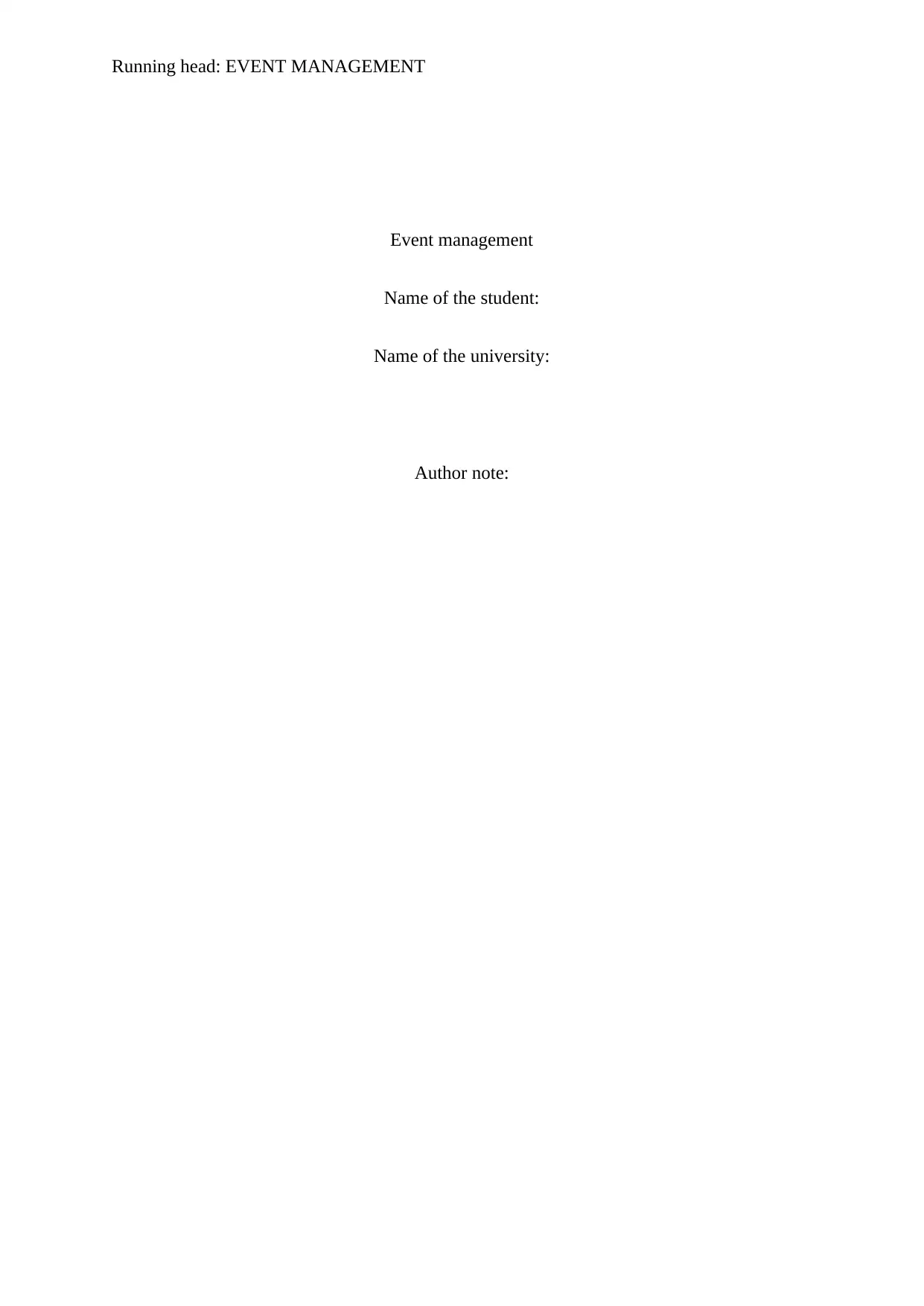
Running head: EVENT MANAGEMENT
Event management
Name of the student:
Name of the university:
Author note:
Event management
Name of the student:
Name of the university:
Author note:
Paraphrase This Document
Need a fresh take? Get an instant paraphrase of this document with our AI Paraphraser
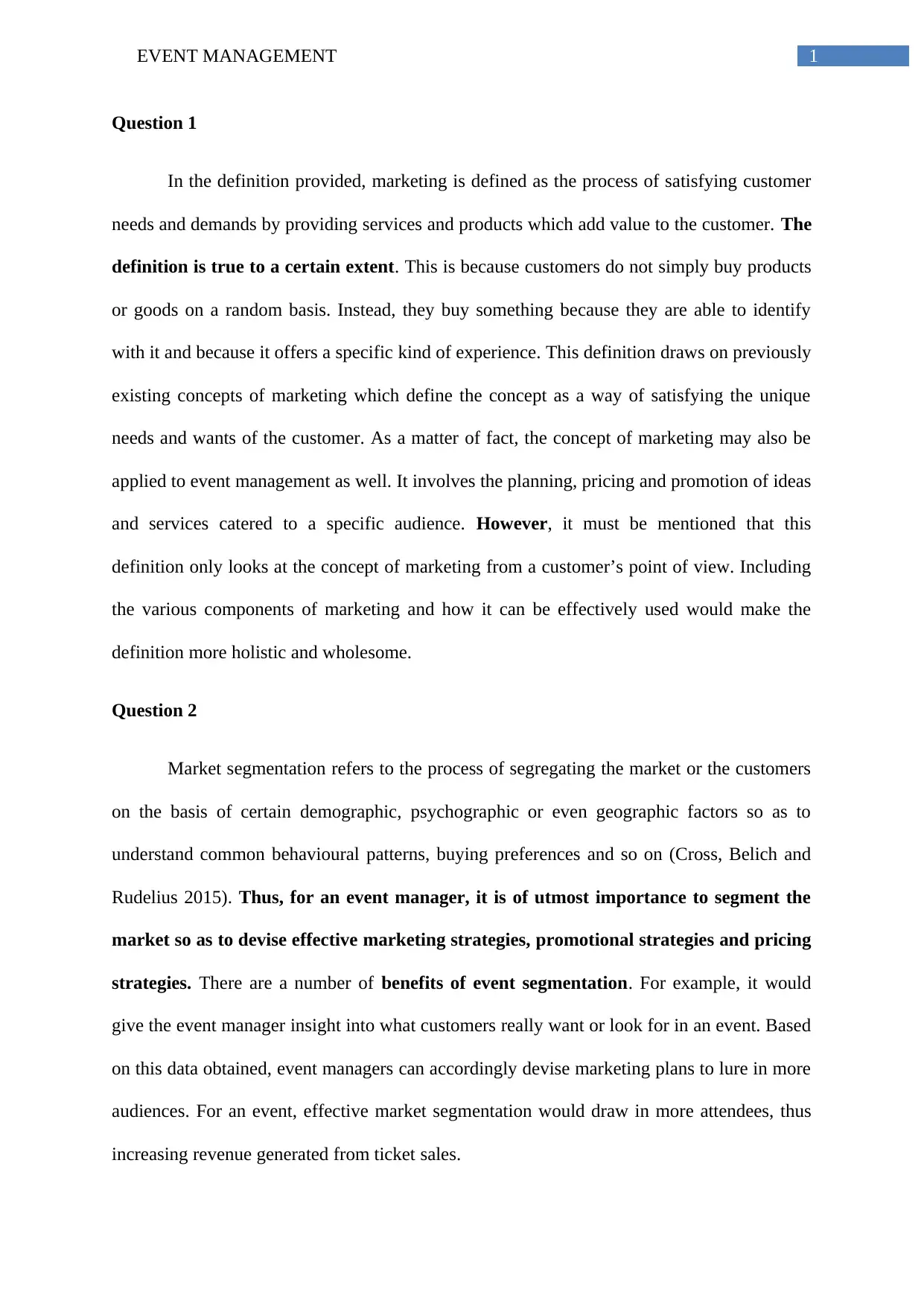
1EVENT MANAGEMENT
Question 1
In the definition provided, marketing is defined as the process of satisfying customer
needs and demands by providing services and products which add value to the customer. The
definition is true to a certain extent. This is because customers do not simply buy products
or goods on a random basis. Instead, they buy something because they are able to identify
with it and because it offers a specific kind of experience. This definition draws on previously
existing concepts of marketing which define the concept as a way of satisfying the unique
needs and wants of the customer. As a matter of fact, the concept of marketing may also be
applied to event management as well. It involves the planning, pricing and promotion of ideas
and services catered to a specific audience. However, it must be mentioned that this
definition only looks at the concept of marketing from a customer’s point of view. Including
the various components of marketing and how it can be effectively used would make the
definition more holistic and wholesome.
Question 2
Market segmentation refers to the process of segregating the market or the customers
on the basis of certain demographic, psychographic or even geographic factors so as to
understand common behavioural patterns, buying preferences and so on (Cross, Belich and
Rudelius 2015). Thus, for an event manager, it is of utmost importance to segment the
market so as to devise effective marketing strategies, promotional strategies and pricing
strategies. There are a number of benefits of event segmentation. For example, it would
give the event manager insight into what customers really want or look for in an event. Based
on this data obtained, event managers can accordingly devise marketing plans to lure in more
audiences. For an event, effective market segmentation would draw in more attendees, thus
increasing revenue generated from ticket sales.
Question 1
In the definition provided, marketing is defined as the process of satisfying customer
needs and demands by providing services and products which add value to the customer. The
definition is true to a certain extent. This is because customers do not simply buy products
or goods on a random basis. Instead, they buy something because they are able to identify
with it and because it offers a specific kind of experience. This definition draws on previously
existing concepts of marketing which define the concept as a way of satisfying the unique
needs and wants of the customer. As a matter of fact, the concept of marketing may also be
applied to event management as well. It involves the planning, pricing and promotion of ideas
and services catered to a specific audience. However, it must be mentioned that this
definition only looks at the concept of marketing from a customer’s point of view. Including
the various components of marketing and how it can be effectively used would make the
definition more holistic and wholesome.
Question 2
Market segmentation refers to the process of segregating the market or the customers
on the basis of certain demographic, psychographic or even geographic factors so as to
understand common behavioural patterns, buying preferences and so on (Cross, Belich and
Rudelius 2015). Thus, for an event manager, it is of utmost importance to segment the
market so as to devise effective marketing strategies, promotional strategies and pricing
strategies. There are a number of benefits of event segmentation. For example, it would
give the event manager insight into what customers really want or look for in an event. Based
on this data obtained, event managers can accordingly devise marketing plans to lure in more
audiences. For an event, effective market segmentation would draw in more attendees, thus
increasing revenue generated from ticket sales.
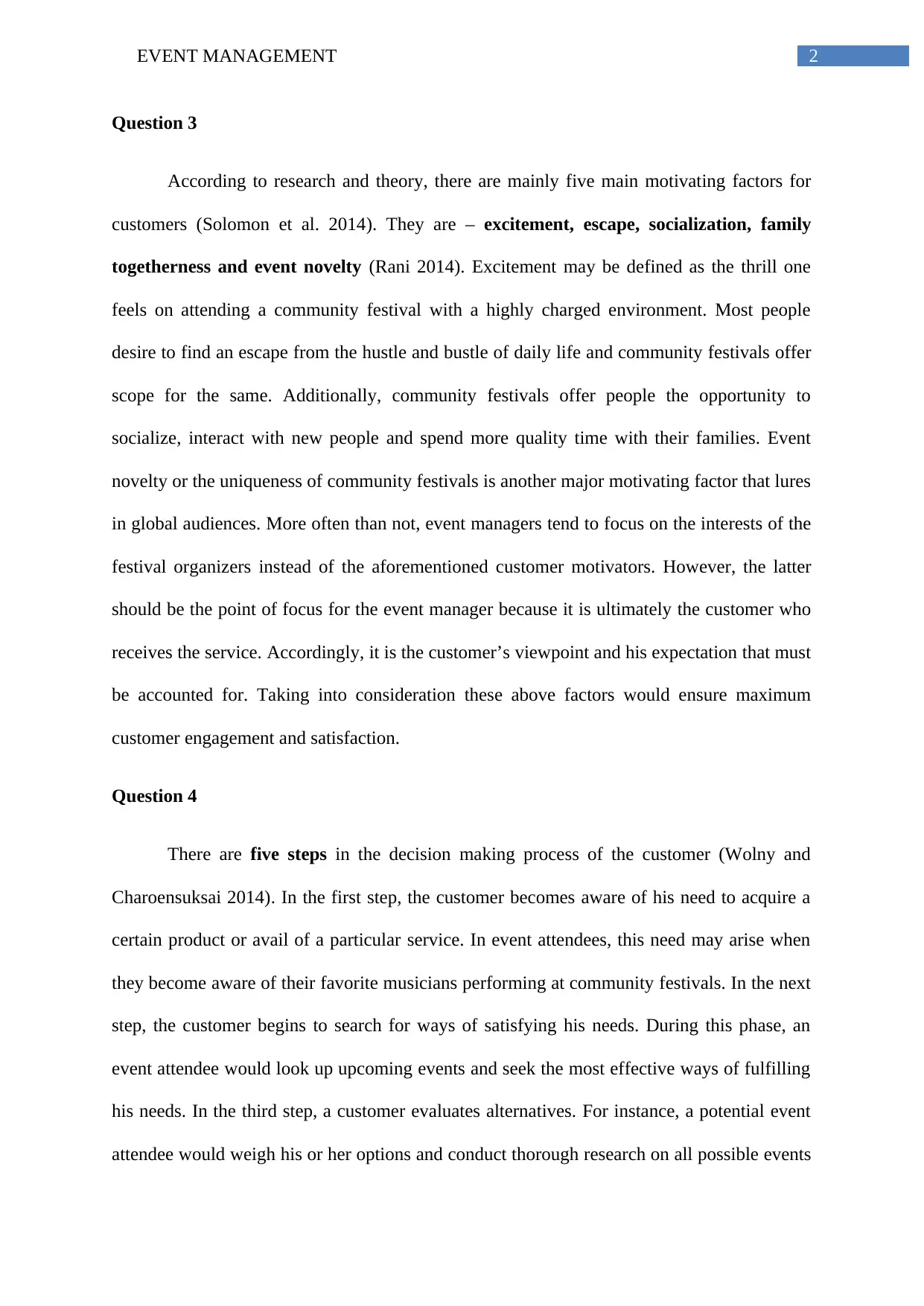
2EVENT MANAGEMENT
Question 3
According to research and theory, there are mainly five main motivating factors for
customers (Solomon et al. 2014). They are – excitement, escape, socialization, family
togetherness and event novelty (Rani 2014). Excitement may be defined as the thrill one
feels on attending a community festival with a highly charged environment. Most people
desire to find an escape from the hustle and bustle of daily life and community festivals offer
scope for the same. Additionally, community festivals offer people the opportunity to
socialize, interact with new people and spend more quality time with their families. Event
novelty or the uniqueness of community festivals is another major motivating factor that lures
in global audiences. More often than not, event managers tend to focus on the interests of the
festival organizers instead of the aforementioned customer motivators. However, the latter
should be the point of focus for the event manager because it is ultimately the customer who
receives the service. Accordingly, it is the customer’s viewpoint and his expectation that must
be accounted for. Taking into consideration these above factors would ensure maximum
customer engagement and satisfaction.
Question 4
There are five steps in the decision making process of the customer (Wolny and
Charoensuksai 2014). In the first step, the customer becomes aware of his need to acquire a
certain product or avail of a particular service. In event attendees, this need may arise when
they become aware of their favorite musicians performing at community festivals. In the next
step, the customer begins to search for ways of satisfying his needs. During this phase, an
event attendee would look up upcoming events and seek the most effective ways of fulfilling
his needs. In the third step, a customer evaluates alternatives. For instance, a potential event
attendee would weigh his or her options and conduct thorough research on all possible events
Question 3
According to research and theory, there are mainly five main motivating factors for
customers (Solomon et al. 2014). They are – excitement, escape, socialization, family
togetherness and event novelty (Rani 2014). Excitement may be defined as the thrill one
feels on attending a community festival with a highly charged environment. Most people
desire to find an escape from the hustle and bustle of daily life and community festivals offer
scope for the same. Additionally, community festivals offer people the opportunity to
socialize, interact with new people and spend more quality time with their families. Event
novelty or the uniqueness of community festivals is another major motivating factor that lures
in global audiences. More often than not, event managers tend to focus on the interests of the
festival organizers instead of the aforementioned customer motivators. However, the latter
should be the point of focus for the event manager because it is ultimately the customer who
receives the service. Accordingly, it is the customer’s viewpoint and his expectation that must
be accounted for. Taking into consideration these above factors would ensure maximum
customer engagement and satisfaction.
Question 4
There are five steps in the decision making process of the customer (Wolny and
Charoensuksai 2014). In the first step, the customer becomes aware of his need to acquire a
certain product or avail of a particular service. In event attendees, this need may arise when
they become aware of their favorite musicians performing at community festivals. In the next
step, the customer begins to search for ways of satisfying his needs. During this phase, an
event attendee would look up upcoming events and seek the most effective ways of fulfilling
his needs. In the third step, a customer evaluates alternatives. For instance, a potential event
attendee would weigh his or her options and conduct thorough research on all possible events
⊘ This is a preview!⊘
Do you want full access?
Subscribe today to unlock all pages.

Trusted by 1+ million students worldwide
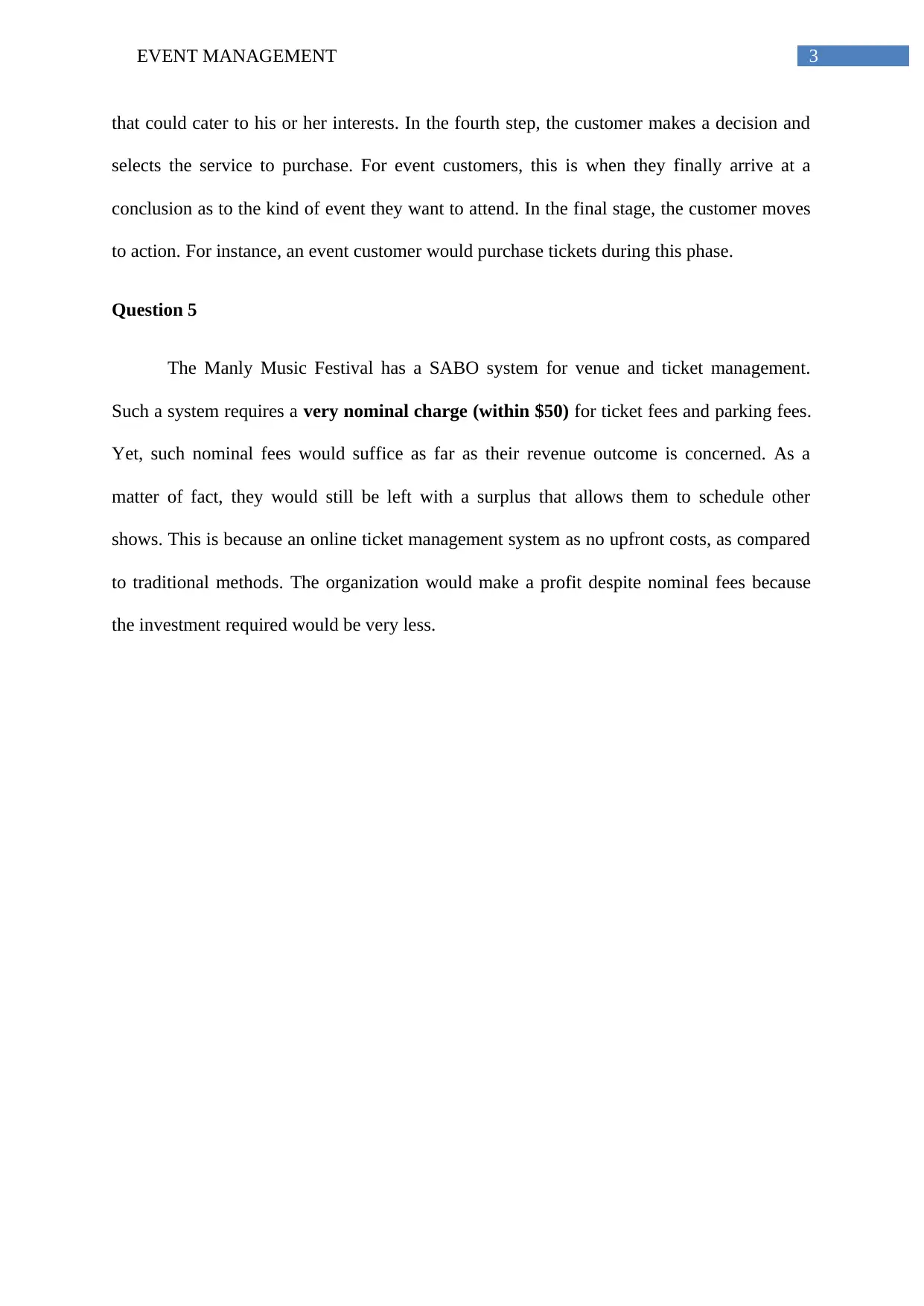
3EVENT MANAGEMENT
that could cater to his or her interests. In the fourth step, the customer makes a decision and
selects the service to purchase. For event customers, this is when they finally arrive at a
conclusion as to the kind of event they want to attend. In the final stage, the customer moves
to action. For instance, an event customer would purchase tickets during this phase.
Question 5
The Manly Music Festival has a SABO system for venue and ticket management.
Such a system requires a very nominal charge (within $50) for ticket fees and parking fees.
Yet, such nominal fees would suffice as far as their revenue outcome is concerned. As a
matter of fact, they would still be left with a surplus that allows them to schedule other
shows. This is because an online ticket management system as no upfront costs, as compared
to traditional methods. The organization would make a profit despite nominal fees because
the investment required would be very less.
that could cater to his or her interests. In the fourth step, the customer makes a decision and
selects the service to purchase. For event customers, this is when they finally arrive at a
conclusion as to the kind of event they want to attend. In the final stage, the customer moves
to action. For instance, an event customer would purchase tickets during this phase.
Question 5
The Manly Music Festival has a SABO system for venue and ticket management.
Such a system requires a very nominal charge (within $50) for ticket fees and parking fees.
Yet, such nominal fees would suffice as far as their revenue outcome is concerned. As a
matter of fact, they would still be left with a surplus that allows them to schedule other
shows. This is because an online ticket management system as no upfront costs, as compared
to traditional methods. The organization would make a profit despite nominal fees because
the investment required would be very less.
Paraphrase This Document
Need a fresh take? Get an instant paraphrase of this document with our AI Paraphraser
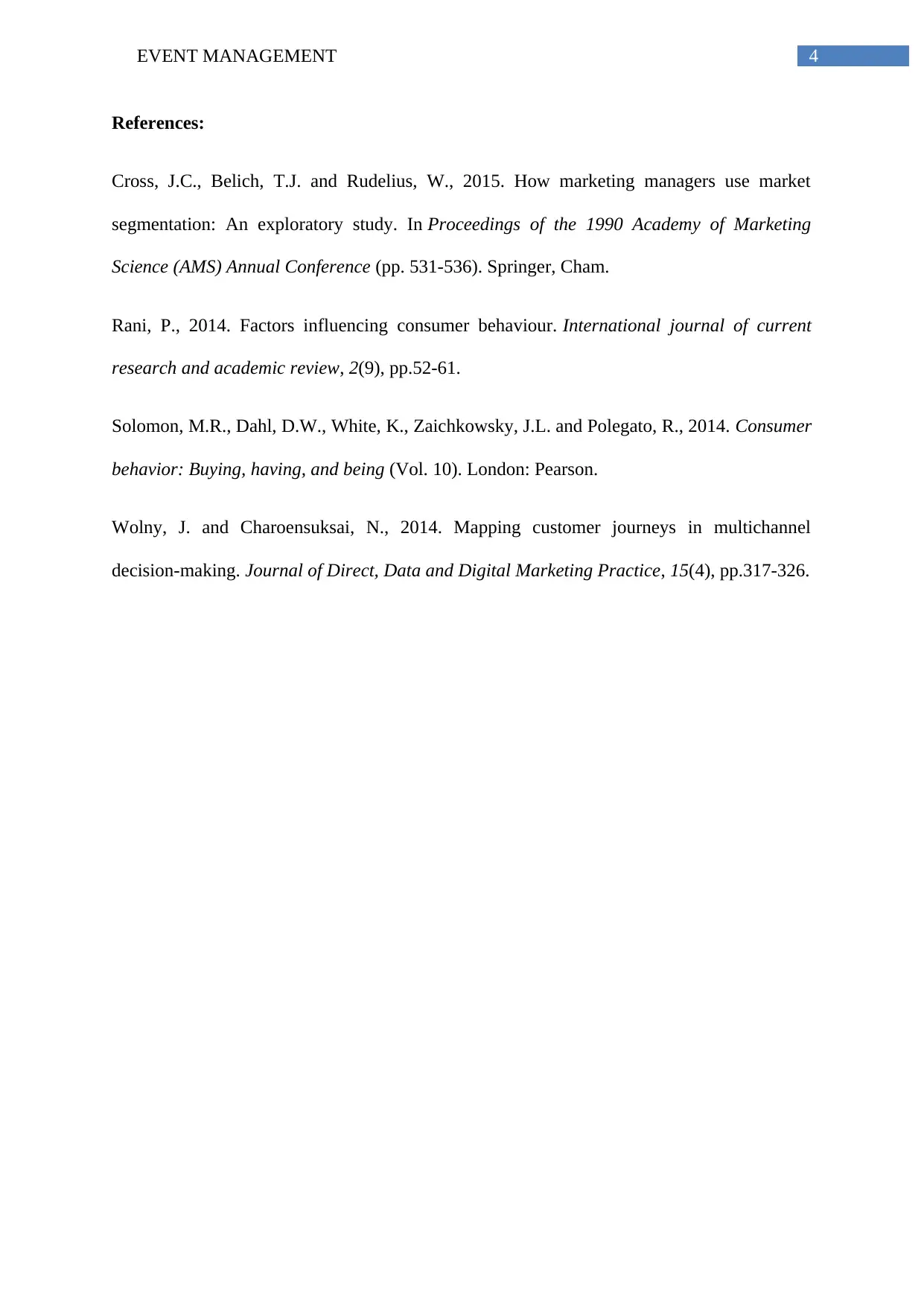
4EVENT MANAGEMENT
References:
Cross, J.C., Belich, T.J. and Rudelius, W., 2015. How marketing managers use market
segmentation: An exploratory study. In Proceedings of the 1990 Academy of Marketing
Science (AMS) Annual Conference (pp. 531-536). Springer, Cham.
Rani, P., 2014. Factors influencing consumer behaviour. International journal of current
research and academic review, 2(9), pp.52-61.
Solomon, M.R., Dahl, D.W., White, K., Zaichkowsky, J.L. and Polegato, R., 2014. Consumer
behavior: Buying, having, and being (Vol. 10). London: Pearson.
Wolny, J. and Charoensuksai, N., 2014. Mapping customer journeys in multichannel
decision-making. Journal of Direct, Data and Digital Marketing Practice, 15(4), pp.317-326.
References:
Cross, J.C., Belich, T.J. and Rudelius, W., 2015. How marketing managers use market
segmentation: An exploratory study. In Proceedings of the 1990 Academy of Marketing
Science (AMS) Annual Conference (pp. 531-536). Springer, Cham.
Rani, P., 2014. Factors influencing consumer behaviour. International journal of current
research and academic review, 2(9), pp.52-61.
Solomon, M.R., Dahl, D.W., White, K., Zaichkowsky, J.L. and Polegato, R., 2014. Consumer
behavior: Buying, having, and being (Vol. 10). London: Pearson.
Wolny, J. and Charoensuksai, N., 2014. Mapping customer journeys in multichannel
decision-making. Journal of Direct, Data and Digital Marketing Practice, 15(4), pp.317-326.
1 out of 5
Related Documents
Your All-in-One AI-Powered Toolkit for Academic Success.
+13062052269
info@desklib.com
Available 24*7 on WhatsApp / Email
![[object Object]](/_next/static/media/star-bottom.7253800d.svg)
Unlock your academic potential
Copyright © 2020–2026 A2Z Services. All Rights Reserved. Developed and managed by ZUCOL.




